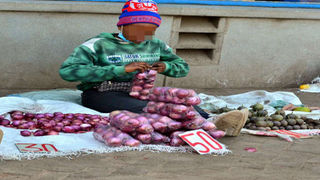
Traders package their groceries in single-use plastic bags on Haile Selassie Avenue in Nairobi on February 4, 2021.
| Francis Nderitu | Nation Media GroupCounties
Premium
Headache for conservationists as plastic bag makes big come back
In 2017, Kenya won praise globally when it banned polythene bags to maintain a healthy environment.
However, four years down the line, the outlawed commodity has made a big comeback. While the thin nylon bag is in use openly in markets and homes, some vendors have also short-circuited the system by embracing the use of cling film, which has equally devastating effects.
In markets and neighbourhood food outlets, the polythene bags have taken over from the non-woven bags that were introduced as an alternative.
A spot-check done by Nation in various markets in the city revealed the unfortunate truth brandished by local traders in broad daylight.
Anthony, a trader at the city market for 10 years, says the use of plastic bags did not stop completely.
A sugarcane vendor along Jogoo Road in Nairobi goes about his business on February 4, 2021.
When the ban was enforced, it was difficult to use them publicly, but over time, it started they have crept back and now almost every small-scale trader is using polythene bags to package their products -- the Mama Mbogas (vegetable sellers) to fruit vendors and even those selling milk using at the ‘milk ATMs’.
Hard to know
“We still use the plastic bag because it is cheap for us and convenient to our customers,” says Anthony.
So, where do they get the illegal plastic bags?
He says traders use word of mouth at the market because it is hard to know the distributor of the bags. The main distributor only sells the plastic bags in the evening and their identity is known only by a few people.
“This distributor is not your usual hawker who will come roaming around day after day looking for people to buy his wares. The only time he comes to the market is when they have received orders,” offers Anthony.
The polythene bag is not only popular among small scale traders, but it is also a favourite among city dwellers who use it to refrigerate food.
“It is very useful especially when you want to store boiled legumes in the fridge. When the ban was issued in 2017, it was very hard to get the polythene bags but now I just make an order using my Mama Mboga and depending on the size I get my 7 by 12-inch polythene bags at Sh100 only,” says Caroline Njoki.
The city, it appears, is yet to make the 100 per cent transition from the use of plastic bags, regardless of the fines, or alternatives offered by the government.
Single-use polythene bags
In a gazette notice published in 2017, the National Environment and Management Authority (Nema) said a person caught using the single-use polythene bags shall be liable to a fine of between Sh2 million and Sh4 million, or imprisoned for between one year and four years, or both.
Butcheries and supermarkets have also found a way to cheat the ban by using cling film to package items.
Samuel Mutie who operates several butcheries and nyama choma joints in Embakasi says the blame falls on the government for coming up with a half-baked plan to effect the ban. He claims users were not provided with realistic alternatives.
“The plastic bag is a multipurpose item and the government never gave us an alternative that was practical. The non-woven bag, unfortunately, is not multipurpose and therefore the demand will always be there for plastic bags,” says Mr Mutie.
But Environment Cabinet Secretary Keriako Tobiko, while admitting that the single-use plastic bag remains a menace, blames neighbouring countries.
“The problem comes from our neighbours because I can assure you that these items are not being produced in Kenya. We are doing our best, but we also have institutional challenges. I am aware that the single-use plastic is still in use,” Mr Tobiko told Nation.
However, Nema Director General Mamo B Mamo confirmed that since the ban, the authority has apprehended five manufacturers in Syokimau, Machakos County.
“We also noticed that the plastic bags have made a comeback and we have already sent officials to all 47 counties for a crackdown. We have teamed up with other agencies, including the police and they will be targeting market places. The challenge we have is behaviour change, also by manufacturers,” said Mr Mamo.




